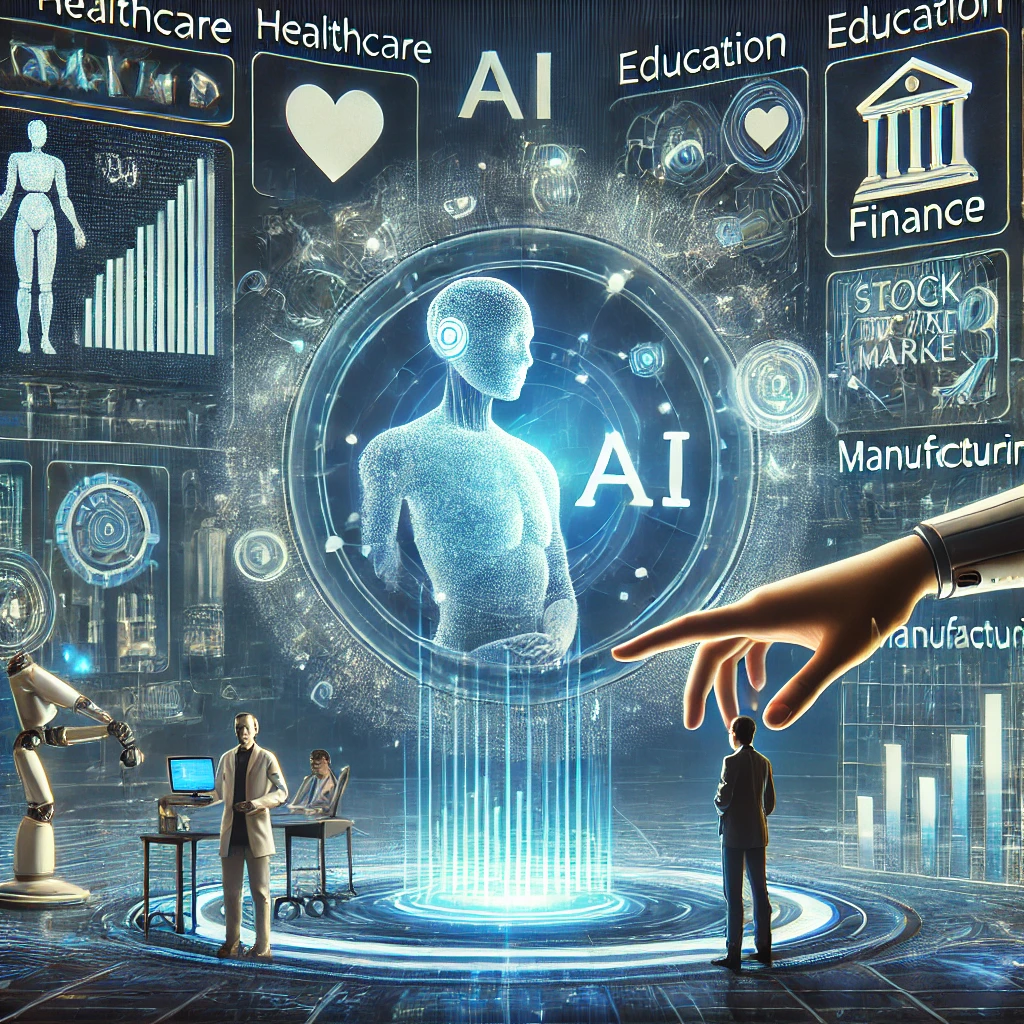
The Rise of AI: Transforming Industries and Shaping Our Future
Artificial intelligence (AI) has gone from science fiction to a central part of our daily lives in a remarkably short span. AI is now a driving force behind innovation across many industries, from healthcare and finance to entertainment and education. Let’s explore how AI is reshaping the world and where its impact is most visible today.
1. AI in Healthcare: Precision and Personalization
In healthcare, AI is changing how we diagnose, treat, and manage illnesses. Machine learning algorithms analyze vast amounts of patient data, leading to early diagnosis and more personalized treatment plans. For instance, AI-powered imaging tools can detect tumors with accuracy, while predictive models anticipate disease risks, enabling preventative measures. Platforms like IBM Watson Health leverage AI to analyze medical literature and help physicians make informed decisions. This rapid adoption is not only improving patient outcomes but also making healthcare more efficient.
AI is also streamlining drug discovery, which is traditionally a long and costly process. By predicting which drug formulations will likely succeed, AI reduces time to market and helps combat diseases faster. The COVID-19 pandemic accelerated the use of AI in vaccine development, a promising sign of what AI could achieve in the pharmaceutical industry.
2. Financial Services: Revolutionizing Risk and Fraud Management
AI is also transforming the financial sector. Banks and financial institutions utilize AI for risk assessment, fraud detection, and customer service automation. Machine learning algorithms can analyze spending patterns and detect unusual transactions, flagging potential fraud more effectively than traditional systems. AI is also essential in high-frequency trading, where algorithms make split-second decisions to buy or sell assets, increasing market efficiency.
Moreover, AI-driven chatbots like those deployed by Bank of America (Erica) and Capital One (Eno) provide 24/7 customer service, handling tasks such as checking balances, making transfers, and answering customer queries. This shift toward automation is not only reducing operational costs but also making financial services more accessible to people around the world.
3. Manufacturing and Logistics: From Automation to Autonomy
The manufacturing and logistics sectors have long used automation, but AI is elevating these capabilities to new heights. AI-powered robotics handle complex tasks, from assembly line operations to sorting and packaging, with precision and speed. In logistics, AI optimizes routes and predicts delivery times, reducing fuel costs and improving customer satisfaction. Self-driving vehicles are another frontier, with companies like Tesla, Waymo, and others working on fully autonomous vehicles that could revolutionize the transportation industry.
Predictive maintenance is another AI-driven advancement in manufacturing. By analyzing data from equipment sensors, AI can predict when a machine is likely to fail, allowing for repairs before breakdowns occur. This minimizes downtime and can lead to significant cost savings.
4. AI in Education: Personalized Learning Experiences
Education is also seeing a transformation thanks to AI, which enables more personalized learning experiences. Adaptive learning platforms assess individual student performance and tailor content to their unique needs, allowing students to learn at their own pace. AI tutors can support students by answering questions, explaining concepts, and offering practice exercises. Platforms like Duolingo use AI to adapt language lessons based on a learner’s strengths and weaknesses, ensuring a more tailored educational experience.
AI is also helping educators by analyzing data on student performance, identifying areas where students may be struggling, and providing insights that help improve teaching methods. However, while AI in education offers numerous benefits, concerns about data privacy and the need for human interaction in learning remain.
5. Entertainment and Media: Creating and Curating Content
In the entertainment sector, AI is redefining how content is created, curated, and consumed. AI algorithms on streaming platforms like Netflix and Spotify recommend content based on user preferences, helping users discover shows, movies, and music they’re likely to enjoy. Generative AI is also used to create music, scripts, and visual effects, with tools like OpenAI’s GPT-4 and DALL-E enabling creators to produce new types of content.
Social media platforms leverage AI to filter content, detect hate speech, and moderate comments, enhancing user safety. Additionally, “deepfake” technology, which uses AI to create hyper-realistic videos of people saying or doing things they never did, is both a fascinating and controversial application that raises ethical questions.
Challenges and Ethical Considerations
While the benefits of AI are impressive, there are significant challenges and ethical concerns. AI systems can sometimes reinforce biases present in the data they’re trained on, leading to issues in fields like hiring, law enforcement, and lending. The “black box” nature of some AI models—where it’s difficult to understand how a decision was reached—also raises accountability concerns.
Furthermore, as AI takes on more tasks, concerns about job displacement are increasing. According to some estimates, automation could impact millions of jobs worldwide, leading to a shift in the job market that will require new skills and roles.
Conclusion
AI is undoubtedly transforming industries and reshaping our lives in ways that were unimaginable just a decade ago. Its applications across healthcare, finance, manufacturing, education, and entertainment showcase its potential to drive growth, improve efficiency, and enhance our quality of life. However, as AI becomes more integrated into society, it’s crucial to address the ethical and societal implications to ensure that it benefits everyone. With responsible development and regulation, AI can continue to be a powerful tool for innovation and positive change.
